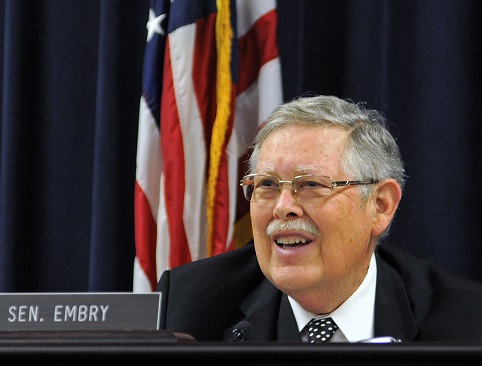
Committee Co-Chair Sen. C.B. Embry Jr., R-Morgantown, asking a question about early childhood investment in Kentucky
FRANKFORT, KY (September 5, 2019)—Over $29 million of Kentucky’s share of a national tobacco settlement went toward early childhood programs last fiscal year, state lawmakers were told yesterday. But early childhood experts shared concerns that funding could lag in the future.
Prichard Committee for Academic Excellence Executive Director Brigitte Blom Ramsey says current economic estimates project “steep” declines in tobacco settlement dollars in future years, with Kentucky’s share of the settlement dropping from $111.3 million this fiscal year to $98.1 million in Fiscal Year 2024 largely due to changes in the tobacco industry.
“Our concern is that those are naturally a dwindling source of revenue for the state. As smoking decreases and the sale of tobacco products decrease, those dollars will also decrease,” Ramsey said. She encouraged the Tobacco Settlement Agreement Fund Oversight Committee and the Kentucky General Assembly to look at ways to continue investment in early childhood programs in future years.
“Not just through tobacco settlement but also to fill the gap as tobacco settlement declines, and to increase investment across the board,” she told lawmakers.
Ramsey expressed concern with data from American Community Survey that shows Kentucky fell to 41st in preschool enrollment of three- and four-year-olds between 2008 and 2018. The state ranked 24th in 2008, per the survey.
She said increased investment across the board can help the state “raise that preschool enrollment number back to the 20s” and encourage better education and workforce outcomes later in life.
And tobacco settlement dollars are the only state funds used as a required match for the federal Child Care Development Block Grant that funds a majority of Kentucky Division of Child Care programs, division Director Dr. Sarah Vanover told the committee. Programs include child care facility monitoring and issuing quality ratings for centers statewide.
The required state match for the block grant last year was $8.98 million, Vanover said.
“The tobacco settlement dollars are our entire match,” she told the committee. “We use those to leverage a huge amount of annual allocations” ranging from child care subsidies for over 47,000 children last fiscal year to monitoring of more than 2,200 child care facilities, she added.
Tobacco Settlement Agreement Fund Oversight Committee Co-Chair Sen. C.B. Embry Jr., R-Morgantown, asked Vanover what percentage of child care facilities monitored by the Division of Child Care serve low-income children. She said a “vast majority” -- 2,067 licensed, certified centers -- qualify to serve children in the subsidy program, but participation varies.
“We currently cover up to the 40th percentile of centers through the child care subsidy program,” she said. “So at 40 percent of the centers in Kentucky, we can cover up the maximum – the entire amount of tuition. Sixty percent of the centers would have some overage; maybe it’s just $15 and week, maybe it’s $20 a week (the parents would have to pay).”
The 2000 Kentucky General Assembly recognized the importance of early childhood learning when it created KIDS NOW (Kentucky Invests in Developing Success NOW) and dedicated 25 percent of the state’s tobacco settlement dollars to the initiative, said Ramsey. Key priorities in that legislation – including supports for high quality child care and voluntary statewide home visits for first-time parents – among other investments are still important today, she said.
“There’s still much to be done if Kentucky is truly going to be committed to ensuring that each and every one of our youngsters benefit from a high-quality learning environment that positions them for success in kindergarten, throughout their years of schooling, and into the workforce,” said Ramsey.
END











